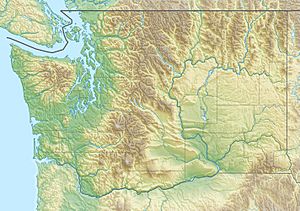Johns River (Washington) facts for kids
Quick facts for kids Johns River |
|
|---|---|
|
Location of the mouth of Johns River in Washington
|
|
| Country | United States |
| State | Washington |
| County | Grays Harbor |
| Physical characteristics | |
| Main source | Willapa Hills North River Divide 535 ft (163 m) 46°53′5″N 123°50′9″W / 46.88472°N 123.83583°W |
| River mouth | Grays Harbor Markham, Washington 0 ft (0 m) 46°54′26″N 124°0′41″W / 46.90722°N 124.01139°W |
| Length | 15 mi (24 km) |
The Johns River is a short river in the U.S. state of Washington. It flows into the southern part of Grays Harbor. This special river is known as a tidal river because its water levels are affected by the ocean's tides.
About the Johns River
This river is located in Grays Harbor County. It is about 15 mi (24 km) long, including its longest branch. The Johns River is an important natural feature of the area.
Where Does it Start?
The Johns River begins in the Willapa Hills. This area is in the southwestern part of Grays Harbor County. Its source is near a place called the North River Divide. This divide separates the Johns River's water from the North River.
The River's Journey
The Johns River has two main parts, like two arms joining together. These are the South Fork and the North Fork Johns River. The North Fork is the longer of the two. Both forks flow generally west and northwest.
Many smaller streams join the Johns River along its way:
- Florence Creek flows into the North Fork.
- The South Fork gets water from Archer Creek, Big Creek, and Hall Creek.
After the two main forks meet, other streams add to the river's flow. These include Balloon Creek, Crawford Ditch, Atwood Creek, Bluff Creek, Gold Creek, and Beaver Creek. Finally, the Johns River reaches Grays Harbor at a town called Markham. This spot is about 5 mi (8.0 km) west of Aberdeen.
Home to Wildlife
The lowest part of the Johns River flows through a special area. This area is called the Johns River Wildlife Area Unit. It is part of the larger Johns River Wildlife Area. This means the river and its surroundings are protected. They provide a safe home for many different kinds of animals and plants.
 | Janet Taylor Pickett |
 | Synthia Saint James |
 | Howardena Pindell |
 | Faith Ringgold |


